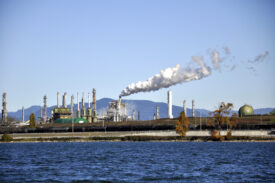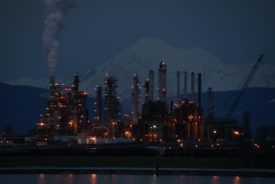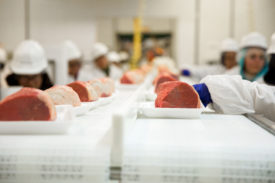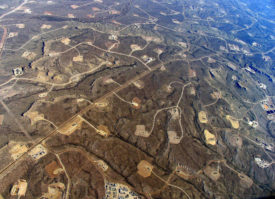Anna:
How many lives will be sacrificed for polluter foot-dragging and influence-peddling? Environmental groups are challenging American Electric Power (AEP) to publicly state the number of lives it’s willing to risk for delaying limits on toxic air pollution:
“AEP made $1.2 billion in profits last year—while America’s children suffered asthma hospitalizations and mercury-related developmental delays. AEP wants America to wait another six years before we limit toxic mercury from some power plants.”
We might ask Senator Richard Burr , R-North Carolina, the same question. He’s introducing a bill that would effectively abolish the EPA!
For a change of pace, I recommend this how-to video on yoking a team of oxen. I ran onto it after hearing that to beat high fuel prices, at least a few American farmers are ditching their tractors for draft power (that is, hulking work animals).
Why do you think gas prices are rising? According to a Pew Research Center/Washington Post survey conducted April 28-May 1, the biggest slice of Americans—about three-in-ten–believe prices are spiking because of corporate greed, oil companies, or speculation. Next up are wars and Mid-east unrest. Notably, only 5 percent said they think that the reason for high gas prices is not enough domestic drilling.
Alan:
If you hold up a bike and give it a gentle push, it will often stay upright for a surprisingly long period before it finally keels over. Physicists have puzzled over this fact—this stability that helps make bikes one of Sightline’s Seven Wonders–for decades. Science News describes recent research by scholars who have knocked over old explanations for bikes’ feats of balance. A gyroscope effect? Nope. A dynamic like a trailer? Nope. We know that bicycles work, but we can’t for the life of us figure out how it’s possible for them to work. There’s a parable somewhere in there.
Clark:
This amused me: a cartoon about the arguments against fossil fuels and wind power.
And here’s a cool time-lapse map of dam construction in the US from 1800 to 2003.
Eric dP:
My reading list is all about Canada this week. Geoff Dembicki has a thoroughly intelligent (and thoroughly chilling) piece on how the Tar Sands oil industry works inside the DC beltway. And at Time, Bryan Walsh analyzes the environmental implications of the Canadian federal election:
Americans like to picture Canada as a progressive, friendly, extremely green and Kyoto Protocol-signing sort of country—and in many ways it is. But the truth is, Canada is also a petrostate.
Finally, Vancouver’s bicycling advocates violate Godwin’s Law in the extreme. The result is hilarious. (And totally inapproriate. And hilarious.)
Eric H:
Three things this week. Two follow up on my junk “food” post last week. Mark Bittman’s column takes another look at marketing junk to kids, which links to this Alternet piece on the billions companies spend getting kids to eat crap.
And lastly, I present to you the Climate Scientist rap (sNSFW language):







